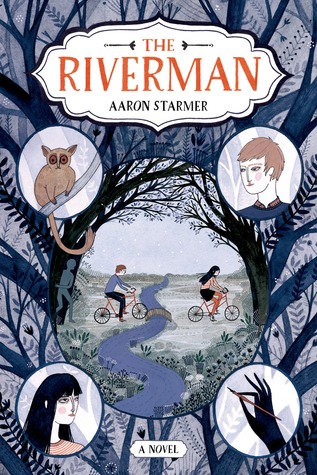 I was still listening to A Snicker of Magic when I picked up The Riverman. I say "picked up" rather than "started reading," because I took it off the shelf and started scanning the first page with no real intention to continue. Then I read the first line: "Every town has lost a child." Everything about the sentence was the polar opposite of A Snicker of Magic - simple and declarative where ASoM is folksy and meandering; dark where ASoM is light*. I had to read on.
I was still listening to A Snicker of Magic when I picked up The Riverman. I say "picked up" rather than "started reading," because I took it off the shelf and started scanning the first page with no real intention to continue. Then I read the first line: "Every town has lost a child." Everything about the sentence was the polar opposite of A Snicker of Magic - simple and declarative where ASoM is folksy and meandering; dark where ASoM is light*. I had to read on.The rest of the paragraph delivered on the grim promise of the first line, and so did the rest of the page, and the chapter. At some point the blurb on the back cover caught my eye, and I thought, "Oh, right: this is the one Jack Gantos blurbed." I don't know if you've noticed this, but El Gantos rarely blurbs, so when he says, "Dive into this book and you may never resurface," you can probably take him at his word.
Brandy described this as what would happen if Far Far Away and Hokey Pokey had a book baby. That's not a bad description, except that I would probably add Coraline to the mix. And maybe, like, Stand by Me? And even Twin Peaks? As Travis said: "What WAS that?"
I think part of what sets this book apart (aside from the excellent, razor-sharp prose) is that it combines a few different genres into one novel (the author even says as much in his note at the beginning). On one level, it's a book about an alternate universe, in the tradition of Alice in Wonderland, Coraline, or yes, Hokey Pokey. On another level, it's a coming of age story about two childhood friends drifting apart as they near adolescence. And on yet another, it's about the menace that lurks beneath the placid surface of eighties small town America.
That setting is a perfect fit for the "missing children" theme, by the way. If, like me, you grew up in the eighties, you probably remember the kidnapping hysteria of those years. Starmer really captures that feeling here, and he maintains a sense of tension throughout much of the novel by not spelling out whether the imaginary world is real, or whether the disappearances result from a more mundane evil. It is a testament to his strength as a writer that I really didn't know where the plot was heading until the end.
Ah, the end. It really muddies the waters of this novel's Newbery chances. I thought the ending was weirdly inconclusive, and not in keeping with the structure of the rest of the novel, until I realized that this book is the first in a planned trilogy. And I'm not sure it really stands alone... too many plot threads are left unresolved.
It is, however, brilliant, and I can't wait to read the next book.
*The first line of ASoM is actually about a town too, and there's a question: are you the kind of reader who's drawn in by "Every town has lost a child," or by "`They say all the magic has gone up out of this place,' said Mama."
Published in March by Farrar, Straus, and Giroux.
Oh, now I will have to move this one up in the TBR stack...
ReplyDeleteSign me up for "Every town has a lost child."
ReplyDeleteMe too, for sure.
DeleteRachael, thank you for pointing out the underlying hysteria of child kidnappings in the 80s. I remember this vaguely, but spent most of my childhood in the 80s in England where it wasn't such a big deal. I spent most of the book seriously annoyed that it was taking place in the 80s as I saw no real reason for that, but that helps. A little anyway.
ReplyDelete